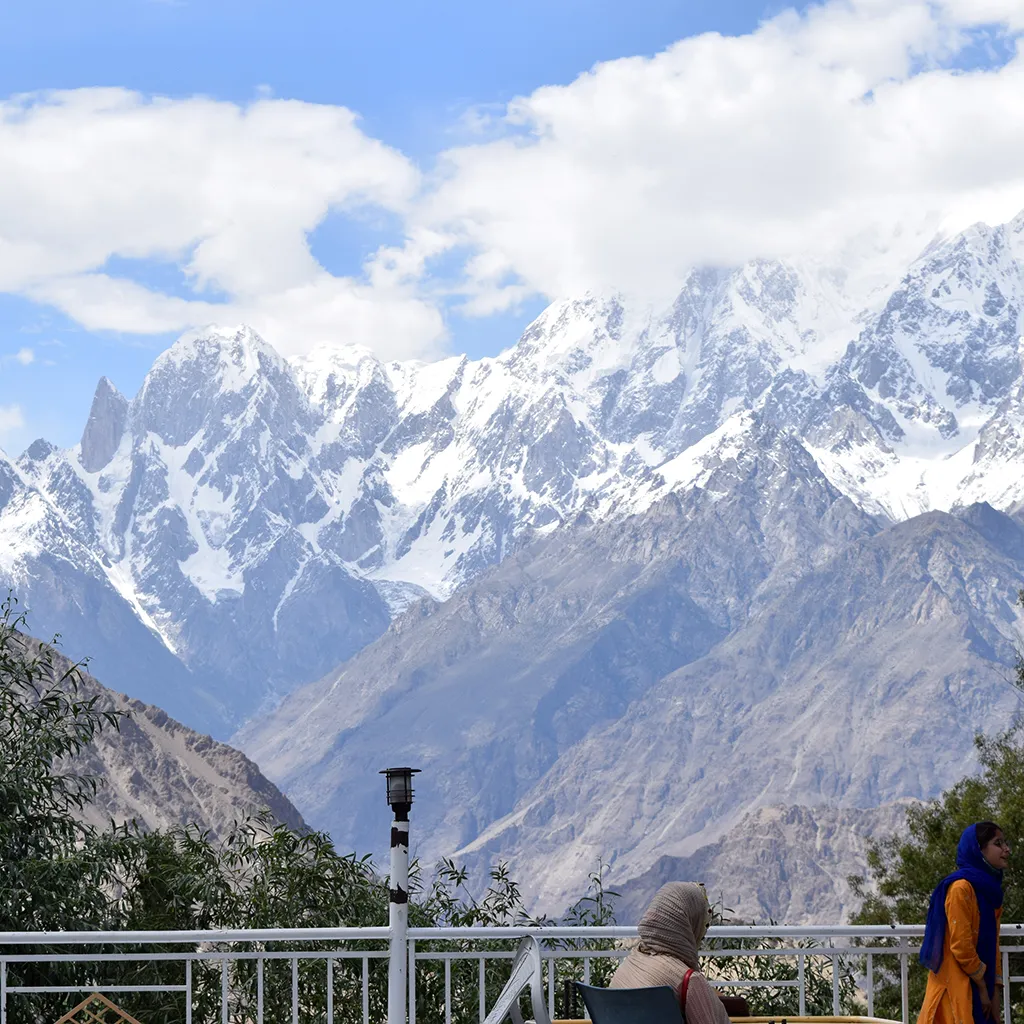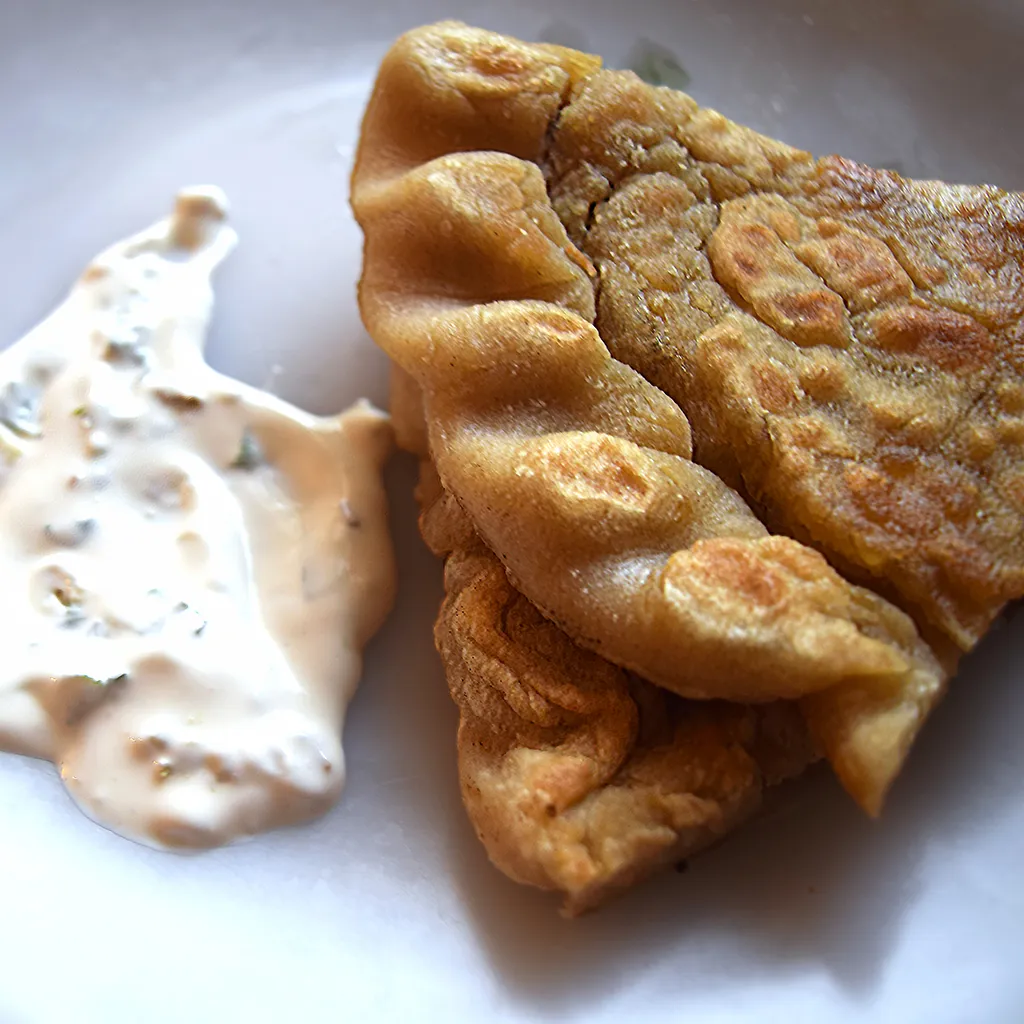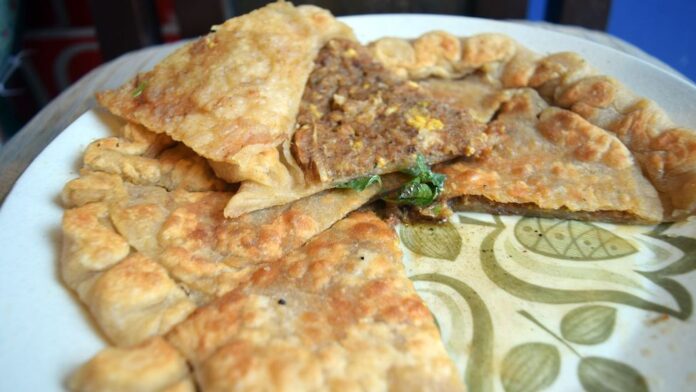Part meat pie, part paratha, and oddly reminiscent of a quesadilla, it is a hearty staple synonymous with world-renowned Hunza hospitality.
“You can use any meat you have for the filling,” explained chef Lal Shahzadi as she deftly pinched two slightly speckled rotis together. Her hands worked with graceful precision, almost on autopilot, sandwiching fragrant minced-meat within fluted folds of dough. “You know, like yak.”
Casting a glance at me standing with my mouth agape and eyes nearly bulging out of their sockets at the thought of eating a shaggy mountain ox, she broke out in an impish grin. “Or chicken.”
Shahzadi runs a small food kiosk named Hunza Food Pavilion near the historical 700-year old Baltit Fort in the town of Karimabad, the capital of Hunza District in the Gilgit-Baltistan province of Pakistan. Against the stunning mountain backdrop of Ultar glacier – and the commandeering presence of the ancient fort – Shahzadi serves up a storm of regional favourites like giyaling (local wheat flour crepes), apricot soup, and chamus – dried apricot juice – to locals and tourists alike. Colloquially known as “Hunza’s Superwoman“, she uses organic and locally sourced ingredients to make authentic regional dishes popular in the Hunza valley.
Of these, chap shuro is perhaps the most iconic, omnipresent and representative dish of the larger Gilgit-Baltistan region. Whether it’s at food stalls set up near the majestic Rakaposhi peak, at an unassuming street vendor in winding market lanes or even in a welcoming family’s home, encountering chap shuro is nearly inevitable.
In the local Burushaski language, chap means meat, gunsho means onions, and shoro means bread. Part meat pie, part paratha, and oddly reminiscent of a quesadilla, it is a hearty staple synonymous with Hunza hospitality; locals are quick to welcome visitors with salty yak milk tea and a hearty meal like chap shuro.
According to Shahzadi, “It’s our local, healthy pizza.”
Shahzadi takes great pride in presenting the delicately crimped chap shuro. It can only be made to order, watching her process is like beholding an artist pulling back the curtain on their craft. It’s an indigenous story of staying warm while welcoming guests playing out in this mountain atmosphere, and Shahzadi relishes each second of the preparation process. She’s not just serving food. She’s sharing her scenic land’s history.
Traditionally, families would bake chap shuro in stone ovens without cooking the meat beforehand, Shahzadi explained – a process that could take up to three hours. As families and demands on time grew, they began making smaller chap shuro in pans over fire, a tradition Shahzadi continues today.

First, she rolled out two individual rotis with a thin wooden rolling pin. For the dough, she explained, “I use whole-wheat, buckwheat or millet flour, grainy and non-refined, right from my lands.”
Next, she gently patted a lightly spiced filling made of onions, garlic, cumin, coriander, mint, saffron, green chilli and minced-meat of choice onto one of the flour disks.
After spreading the filling, Shahzadi placed a second roti on top, nimbly pressing, twisting and turning the edges to create a piecrust-like border that does more than just keep the filling inside; it adds an element of flair to the chap shuro.
Shahzadi rested a large rectangular wooden spatula on top of the chap shuro to keep it flat as it fried in the shallow pan, dousing it with headily fragrant apricot and walnut oil for a sweet, nutty taste. “I extract my own oil from the almond-kernels inside the [apricot] seed, and walnuts from my orchards,” she said.
Each step of Shahzadi’s process showcases a proud craftsmanship deeply influenced by the rustic terrain. “I grind my spices by hand, too, and make sure to get locally raised chicken, goat or yak,” Shahzadi said.
There are endless variations on the dish. Some chefs (such as Shahzadi) prefer to pre-cook the meat filling, while others marinate the mixture in advance and allow it to steam in the dough while frying.
And depending on how the dish is prepared, the chap shuro bread can resemble the cloudy, soft texture of naan when no oil is used, or it can be fried to a crispy, golden crunch. Serving styles vary too. While Shahzadi presents chap shuro cut in triangular wedges like slices of pizza, many families slice off the top roti – like levelling a cake – and break off small pieces to scoop up the meat.
Regardless of the differences, chap shuro is an extension of Hunza’s genuine hospitality: a beautiful spin on staples like meat, onions and bread, crafted with love to reflect the local peoples’ earnest desire to welcome you into their homes, and their hearts.

Chap Shuro recipe
By Lal Shahzadi
At her food kiosk, Shahzadi chops the meat by hand for a chewy texture, and she cuts the finished chap shuro into pizza slices and serves it with a thick, nutty, yogurt raita. Instead of frying, the chap shuro can also be baked for 30 minutes and brushed with apricot or walnut oil at the end.
Serves 2
INGREDIENTS
For the dough:
350g (2½ cups) flour (whole wheat, buckwheat or millet
1 tsp salt
water as required (varies according to the flour used, typically ranging from 1 to 1½ cups)
For the raita:
½-1 cup yoghurt (preferably full-fat)
2 tbsp paneer (use cottage cheese if unavailable)
handful each of fresh coriander and mint leaves, minced
handful of fresh green chillies, minced (optional)
handful of coarsely crushed walnuts and apricot kernels
For the filling:
2 tbsp oil (preferably apricot or walnut, but use any neutral oil if these are unavailable)
½ cup chopped onions
½ cup chopped tomatoes (optional)
200g minced meat of choice
1 tbsp fresh garlic paste or minced garlic
½ tsp cumin powder (or dry roasted and coarsely ground cumin seeds)
½ tsp coarsely ground black pepper
1 cup water
1 tbsp saffron dissolved in 1 tbsp water
a handful of freshly chopped mint and coriander
2 tbsp finely chopped green chilies (optional)
salt
To fry:
4 tbsp oil (preferably apricot or walnut, but use any neutral oil if these are unavailable)
Method
Step 1
To make the dough, combine the flour, salt and water and knead until a firm dough forms. Divide into four pieces and set aside.
Step 2
Make the raita by whisking all the ingredients in a bowl. Keep refrigerated.
Step 3
Prepare the filling. In a large frying pan, heat the oil over medium-low heat. Add the onions (and tomatoes, if using) and sauté until the onions are translucent. Add the minced meat and cook, stirring, until slightly browned. Add the garlic paste and cook until the fragrance fades, approximately 1 minute. Add cumin powder, pepper and water, then season with salt. Cover and cook on medium heat until the oil separates, 8 to 10 minutes.
Step 4
After removing the lid and turning off the heat, swirl the dissolved saffron water mixture into the meat. Add the mint, coriander, and green chillies if using. Season with salt. Set aside.
Step 5
Roll out one roti/tortilla (approximately 20cm/8in in diameter, but it really depends on the size of your pan) then take half of the filling and spread it in a thick, even layer, leaving 1-2 cm/½ in or so of the circumference clear.
Step 6
Roll out another roti/tortilla of roughly the same size and place on top. Use the palm of your hand to seal the two discs of dough together, then use your index fingers and thumb to indent, pinch and crimp the border at a sloped angle. Work your way around the entire circle until the meat is securely sealed inside. Repeat this with two more roti and the remaining half of the meat filling.
Step 7
Heat 1 tbsp of oil in a large shallow frying pan over medium-low heat. Carefully place or slide the chap shuro into the pan and pour another 1 tbsp of oil on top. Allow it to cook until golden on one side, gently pressing and rotating it with a large spoon or spatula. Flip and cook the other side. Each side should take approximately 3 minutes. Repeat with the remaining oil and chap shuro.
Step 8
Cut the chap shuro into pizza slices and serve with the raita. While chap shuro can be enjoyed on its own, the thick, tangy raita cuts through the meat and fried dough beautifully.
Tip
For extra crunch and bite, reserve some of the raw chopped onions and add them to the filling once the meat is cooked.
Source – BBC Travel










